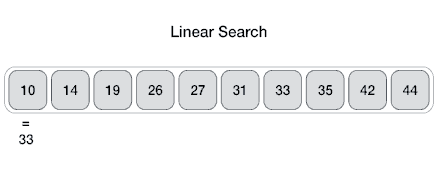# **Algorithm 演算法搜尋筆記**
**[此筆記的原始碼](https://hackmd.io/qi8shArlSsS09WCNOVLyow?both)**
---
## 搜尋演算法
* 線性搜尋(Linear search)
* 二元搜尋(Binary search)
* 指數搜尋(Exponential search)
* 插補搜尋(Interpolation search)
* 費氏搜尋(Fibonacci search)
### **線性搜尋(Linear search)**
#### 從第一個元素開始,依照順序,接續判斷是否為要搜索的元素,非常簡單。

此種方法的優點是原陣列內部的元素不需要是排序過後的,因此若有新的元素加入陣列也可以直接搜尋,但是缺點是倘若被搜尋的元素是在陣列的末端,那麼將會耗費相當巨量的時間。
#### 時間複雜度:
Note:假設有陣列中有$n$個元素
* Best Case:$O(1)$,剛好第一個index就是被搜索的元素
* Worst Case:$O(n)$,被搜索的元素在陣列末端,因此需要執行$n$次比對的步驟。
#### C code:
```c=
#include <stdio.h>
#define SIZE 10
int linear_search(int *, int);
int main(){
int array[SIZE]={1,6,5,7,9,5,4,2,8,10};
int index;
index=linear_search(array,5);
printf("%d\n",index);
return 0;
}
int linear_search(int *array, int number){
int index=0;
for(index=0;index<SIZE;index++){
if(array[index]==number){
return index;
}
}
//if the element doesn't appear in the array
return -1;
}
```
code:https://github.com/coherent17/search-algorithm/blob/main/search/linear_search.c
### **二元搜尋(Binary search)**
#### 或稱為二分搜尋法,可以在"已排序"的序列中進行高效率的搜尋。

取已排序資料中間index的值來跟被搜尋的數來比較,若非此數,則將資料以中間索引分半。若較小,則選擇較小的那半資料,再取較小那半資料中間的數字來比大小,反之亦然,持續重複步驟,便能找到該數。
#### 時間複雜度:
Note:假設有陣列中有$n$個元素
* Best Case:$O(1)$,剛好中間的數值就是被搜索的數值
* Worst Case:$O(log(n))$,最慘需要折半對比$log_2(n)$次。
#### C code:
有兩種版本,一種是用迴圈的,另一種則是用遞迴。
在這邊有一個特別需要注意到的事情為中點的計算方式:
```c=
int mid=(left+right)/2;
```
若是使用這種計算方法,當$left$及$right$的總和超過$int$的範圍,那麼這邊將會出現不可預期的錯誤。
當($left+right>2^{31}-1$)將會溢位。那要如何改善呢?
```c=
int mid=left+(right-left)/2;
```
透過上面中點位置取法的改變,因為$right \geq left$,因此$right-left$就不會出現overflow的情形了!
##### 迴圈版(iterative binary search):
```c=
#include <stdio.h>
#define SIZE 10
int iterative_binary_search(int *, int, int, int);
int main(){
int array[SIZE]={1,2,3,4,5,6,7,8,9,10};
int index;
printf("iterative_binary_search:");
index=iterative_binary_search(array,0,SIZE-1,8);
printf("%d\n",index);
return 0;
}
int iterative_binary_search(int *array, int left, int right, int number){
while(left<=right){
//mid point index:
int mid=left+(right-left)/2;
//check if the number is at mid
if(array[mid]==number) return mid;
//if number is greater than mid, search right array
else if(number>array[mid]) left=mid+1;
//if number is smaller than mid, search left side
else right=mid-1;
}
//the element isn't in the array
return -1;
}
```
code:https://github.com/coherent17/search-algorithm/blob/main/search/iterative_binary_search.c
##### 遞迴版(recursive binary search):
```c=
#include <stdio.h>
#define SIZE 10
int recursive_binary_search(int *, int, int, int);
int main(){
int array[SIZE]={1,2,3,4,5,6,7,8,9,10};
int index;
printf("recursive_binary_search:");
index=recursive_binary_search(array,0,SIZE-1,3);
printf("%d\n",index);
return 0;
}
int recursive_binary_search(int *array, int left, int right, int number){
if(left<=right){
//mid point index:
int mid=left+(right-left)/2;
//check if the number is at mid
if(array[mid]==number) return mid;
//if number is greater than mid, search right array
else if(number>array[mid]) return recursive_binary_search(array, mid+1, right, number);
//if number is smaller than mid, search left side
else return recursive_binary_search(array, left, mid-1, number);
}
//the element isn't in the array
return -1;
}
```
code:https://github.com/coherent17/search-algorithm/blob/main/search/recursive_binary_search.c
用binary search的優點是非常有效率,可以看到worst case中,他的時間複雜度為$O(log(n))$,拿實際一點的數字來舉例,當有64筆資料,則最多需要試$log_2(64)=6$次,而當有128筆資料,則最多需要試$log_2(128)=7$次,可以看出隨著$n$增加,所需要試的次數增長是趨緩的。雖然使用binary search效率高,但是在使用binary search上有一個大前提是該數列必須要是"已排序"的數列。
### **指數搜尋(Exponential search)**
#### 為二分搜尋法的變形,可以在已排序後的陣列較快速的找到被搜尋的數值,不像Binary search是有邊界限制的。且被搜尋的數排在序列的越前面,效率越高。能夠縮小binary search進行的範圍,使其效率比binary search高。

逐次比較被搜尋數與序列中index為2的冪次的數,直到被搜尋的數字大於序列中index為$2^k$的數,則針對$array[2^{k-1}:2^{k}-1]$進行binary search,即可找出該數。
Note that:
若$2^{k}-1$已經超出陣列的長度了,那麼我們將取陣列最後一個元素為binary search的右端點,因此真正再進行binary search的陣列為$array[2^{k-1}:min(2^{k}-1,size\ of\ array)]$
舉例說明:
假設要找的數字為$47$
| 0 | 1 | 2 | 3 | 4 | 5 | 6 | 7 | 8 | 9 |
| --- |:---:| --- | --- | --- | --- | --- | --- |:---:|:---:|
| 2 | 9 | 30 | 32 | 38 | 47 | 61 | 69 | 79 | 81 |
* Step 1:先比較$array[2^0]$是否大於被搜尋的數字47? 9<47
* Step 2:再依序比較$array[2^1],array[2^2],array[2^3]$,發現到$array[2^3]$時,其數值已經大於被搜索的數字了。
* Step 3:此時已經將binary search的範圍縮小到$array[2^{2}:2^{3}-1]$,再進行binary search即可找到被搜索數。
#### 時間複雜度:
Note:假設有陣列中有$n$個元素
* Best Case:$O(1)$,剛好一開始的數值就是被搜索的數值
* Worst Case:$O(log(n))$,當被搜索數接近陣列的開頭,效率會高於binary search
#### C code:
```c=
#include <stdio.h>
#define SIZE 10
int find_min(int, int);
int binary_search(int *, int , int , int);
int exponential_search(int *,int);
int main(){
int array[SIZE]={1,2,3,4,5,6,7,8,9,10};
int index=exponential_search(array,8);
printf("%d\n",index);
return 0;
}
int find_min(int a, int b){
if(a<=b) return a;
else return b;
}
int exponential_search(int *array,int number){
if(array[0]==number) return 0;
//find the index to do the binary search
int index=1;
while(index<SIZE && array[index]<=number){
index*=2;
}
//do the binary search at array[index/2+1]~array[min(index-1,size of array)]
return binary_search(array, (index/2),find_min(index-1,SIZE-1),number);
}
//use recursive binary search
int binary_search(int *array, int left, int right, int number){
if(left<=right){
//mid point index:
int mid=left+(right-left)/2;
//check if the number is at mid
if(array[mid]==number) return mid;
//if number is greater than mid, search right array
else if(number>array[mid]) return binary_search(array, mid+1, right, number);
//if number is smaller than mid, search left side
else return binary_search(array, left, mid-1, number);
}
//the element isn't in the array
return -1;
}
```
code:https://github.com/coherent17/search-algorithm/blob/main/search/exponential_search.c
### **插補搜尋(Interpolation search)**
#### 一樣是二分搜尋法的變形,不過尋找中間點的index改為使用數學中的內插法來進行。
此被搜尋的數列必須為"已排序的數列",取最小及最大的兩點算出斜率,而後透過數學上的內插法去計算該被搜尋數的可能位置在哪裡,而後以那點為中點,最小及最大為範圍,進行比較,若該數大於剛剛算出的中點,則將剛剛的中點改為下界,再次使用內插法算出該數可能的位置。反之亦然。
#### 內插法:
設$(left,data[left])$,$(right,data[right])$為上限及下限的索引及所對應的數值。
兩點間的斜率為:
* $\frac{data[right]-data[left]}{right-left}$
使用點斜式造出通過此二點的線:
* $y-data[left]=\frac{data[right]-data[left]}{right-left}(x-left)$
設被搜尋數為$number$,而透過內插法求出他可能的索引值為$index$
將$(index,number)$代入上式整理後可以得到我們預期被搜索數出現的$index$為:
* $index=left+\frac{number-data[left]}{data[right]-data[left]}(right-left)$
而後我們去比較$data[index]$與$number$的關係:
* **Three cases**:
* Case 1:$number = data[index]$
* Case 2:$number > data[index]$
* Case 3:$number < data[index]$
若為Case 1,那就成功找到該數了,若為Case 2,則將剛剛的$left$改為$index+1$,而後繼續使用內插法算出新的$index$直到找到數字為止。若為Case 3,則將剛剛的$right$改為$index-1$,而後繼續使用內插法算出新的$index$直到找到數字為止。
#### 舉例說明:
假設要找的數字為$84$
| 0 | 1 | 2 | 3 | 4 | 5 | 6 | 7 |
| --- |:---:| --- | --- | --- | --- | --- | --- |
| 13 | 21 | 34 | 55 | 69 | 73 | 84 | 101 |
透過內插法,可以得知$index:$
$index=0+\frac{84-13}{101-13}(7-0)=5.6 \sim 5$
| 0 | 1 | 2 | 3 | 4 | 5 | 6 | 7 |
| --- |:---:| --- | --- | --- | ----------------- | --- |:---:|
| 13 | 21 | 34 | 55 | 69 | $\color{red}{73}$ | 84 | 101 |
由於$73$小於被搜索的數,因此將對後面的資料進行同樣的搜索,即將$left$改為剛剛算出來的$5+1$。
因此新的$index:$
$index=6+\frac{84-84}{101-73}(7-5)=6$
| 0 | 1 | 2 | 3 | 4 | 5 | 6 | 7 |
| --- |:---:| --- | --- | --- | --- | ----------------- |:---:|
| 13 | 21 | 34 | 55 | 69 | 73 | $\color{red}{84}$ | 101 |
成功找到該被搜尋數了!
#### 時間複雜度:
Note:假設有陣列中有$n$個元素
* Best Case:$O(1)$,透過內插法直接找到正確的索引值(資料為線性分布)
* Worst Case:$O(n)$,近似線的公式與實際上誤差很大,每次都剛好只有排除一個元素
#### C code:
```c=
#include <stdio.h>
#define SIZE 8
int interpolation_search(int *, int);
int main(){
int array[SIZE]={13,21,34,55,69,73,84,101};
int index=interpolation_search(array,84);
printf("%d\n",index);
return 0;
}
int interpolation_search(int *array, int number){
int left=0;
int right=SIZE-1;
while(number >= array[left] && number <= array[right] && left <= right){
int index;
//interpolation to find the index
index=left+(number-array[left])/(array[right]-array[left])*(right-left);
//when left meet right
if(left==right){
if(array[left]==number) return left;
else return -1;
}
//if the number appear at the index
if(number==array[index]) return index;
//if the number is greater than array[index]
else if(number > array[index]) left=index+1;
//if the number is smaller than array[index]
else right=index-1;
}
//the element isn't in the array
return -1;
}
```
code:https://github.com/coherent17/search-algorithm/blob/main/search/interpolation_search.c
 Sign in with Wallet
Sign in with Wallet
 Sign in with Wallet
Sign in with Wallet